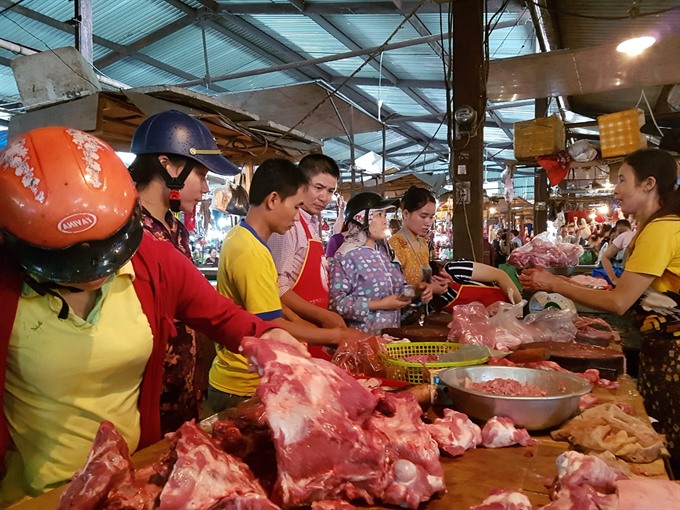 Society
Society

Workers at industrial zones, in the recent month, have shouldered increasing financial burdens as prices of necessaries including food and fuel have kept increasing.
 |
| Residents in the central province of Hà Tĩnh at a local market. Labourers across the country have had to tighten their spending in recent months as food and fuel prices rise. — VNA/VNS Photo Hoàng Ngà |
HÀ NỘI — Workers at industrial zones have shouldered increasing financial burdens as prices of necessaries including food and fuel rises.
While some people decide to tighten their spending habits, others have been forced to ask their families for help.
Nguyễn Thị Thắm, a worker of Nissei Company in the outlying district of Đông Anh, Hà Nội, told Lao Động (Labour) newspaper that she found food prices climbing significantly.
At the village market near where her family stay, a bunch of water spinach has raised from VNĐ3,000 (US$0.13) to VNĐ5,000 ($0.22). A kilogram of fish now costs VNĐ100,000 ($4.4) compared to VNĐ90,000 ($3.9).
“Prices are rising, making our lives more difficult,” she said.
“We spend about VNĐ2 million ($88) a month on food, increasing VNĐ200,000 – 400,000 ($8.8 - 17.5), not to mention rental cost and other bills. Therefore, our monthly income of VNĐ7 to 8 million ($300 - 350) enables us only to make ends meet,” she added.
To deal with the financial shortage, Thắm sent her five-year-old son to her hometown, asking her parents to take care of him.
After her husband pass away, Đặng Thị Thuỷ, a worker of Asti Company in Quang Minh Industrial Zone, struggles to bring up her three children with a monthly salary of VNĐ6 million ($260).
“Many products have witnessed an increase in price. Therefore, I decided to tighten my spending and reduce my diet portion. Otherwise, it will be a huge problem when my kids fall ill,” she said.
Food prices at HCM City’s markets are also rising, the newspaper reports. Mỹ, a worker of a garment factory near Thạnh Xuân market in District 12 said pork and vegetable cost more than before.
To avoid budget deficit, she stops buying expensive vegetables such as cauliflower and bell pepper, reduces the amount of pork and fish in meals and looks for alternatives.
Hoà, another worker at Tân Thới Hiệp Industrial Zone in District 12, said the increase of VNĐ1,000 ($0.04) for one product sounded small but could still impose a burden when considering the total spending on food.
“If the price keeps rising, I will have to change my spending habit and find a part-time job. I must try to work harder to secure my children’s diet,” she said.
Not only food, workers are facing struggles to make pay bills. Khổng Thị Loan, a worker staying in Mê Linh District, Hà Nội, said rental cost increased by more than VNĐ100,000.
“We spend all our income of VNĐ12 million ($530) on renting a house, buying food, paying bills and tutor fees for the kids,” she said.
Facing the same problem, Đinh Thị Thanh Tuyền, a worker of Việt – Nhật Company in Hưng Yên Province, needs help from her family. As her parents still live in the countryside, Tuyền usually gets vegetables and rice from them.
Responding to the phenomenon, Trần Thu Phương, deputy head of Hà Nội Industrial Zone Labour Union, said they asked owners of houses for rent to not raise electricity and water cost. Nguyễn Đức Chung, head of Hà Nội People’s Committee, tasked Department of Industry and Trade to handle the case.
“I think Hà Nội authorities need to tighten management on service providers and markets around industrial zones, preventing them from raising prices of necessaries too high. In addition, it is essential that the Government have to impose policies of price stabilisation. — VNS









